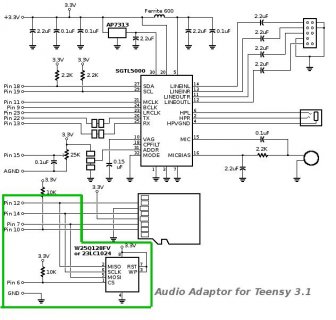I just bought an Teensy 3.2 and am certain it will help with some of my goals, but I'm hoping it packs enough horsepower to do all simultaneously and am looking for some feedback on that. I have an application where I would like to take in and audio stream (13 bit mono is plenty), perform FFT on it and bucket into 7 or 8 "octaves", delay it be about 300-500 ms., then output via DAC (11 bit is fine). Simultaneously I would like to be shipping the FFT octave values across the serial port (1 byte magnitude per octave, so, say 8 bytes) 10 times a second. Should one 3.2 be capable of keeping up with all this on its own?
Andy
Andy


